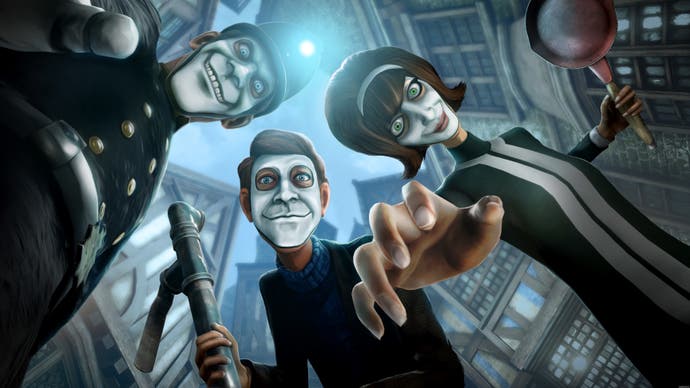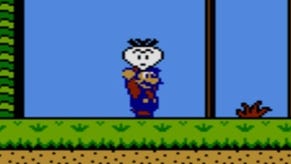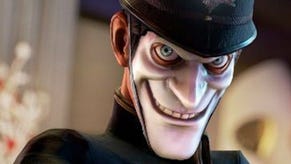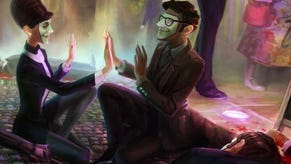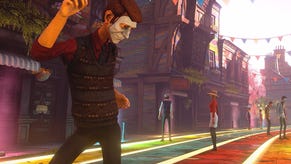We Happy Few review - a rich and dizzying social satire that is seldom great fun to play
Cruel Britannia.
For a British person of a certain age, playing We Happy Few is like being spoonfed your own sick. I intend this entirely as praise. To be more specific, it's like being spoonfed sick originally vommed up by King Arthur and stored in a vase for centuries at Windsor Palace, chewed over by Winston Churchill, shipped to the New World alongside the Beatles and Pythons and hereby returned to us with sprinkles on top by Canadian studio Compulsion Games. By "sick" I of course mean Great British culture, that terrible extent of table manners, bucolic landscapes, desperate irony and colonial nostalgia that has come to serve as a key export in the absence of our old manufacturing industry.
An uneven yet fascinating first-person role-player that mingles elements of immersive sim design with open world survival mechanics, We Happy Few is a love letter to all this, and - well, let's just say the letter isn't written in ink. Set in the cheerily nightmarish, procedurally generated township of Wellington Wells during an alternate history in which World War 2 ended rather differently, it's a dystopian compilation of British traditions - the keep-calm-and-carry-on ethic of the Forties, the fledgling consumer culture of the Fifties, the sugary tunes and hedonism of the Sixties. Riffing on the films of Stanley Kubrick and Terry Gilliam, the portrayal is absurd, fulsome, both dainty and menacing, with all manner of sceptred arcana popping through the seams of its tweed jacket as it brings a cudgel squarely down on your face.
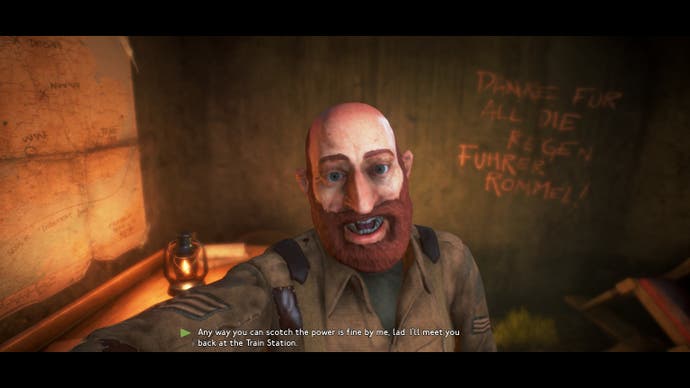
Head to the Parade District, the game's most affluent area, and you'll find candystripe roads, stooped cobblestone houses and tar-beamed pubs tucked in amongst modern residences with space age furniture. Citizens - their high spirits and homogeneity ensured by mandatory white masks - play hopscotch, cuddle on benches, march up and down jauntily with elbows akimbo, trade morsels of village gossip. Did you know the circus is coming to town? Have you heard about Constable Rossetti's wife's cake? In amongst them you'll find the Bobbies, all crocodile grins and Slenderman proportions, ever ready with a hat-tip and a "right as rain, sir, right as rain". Venture outside at night, not that any true Brit would ever violate curfew, and you'll hear them whistling God Save The Queen as they comb the fog for undesirables.
Presiding over everything is Uncle Jack, Wellington Wells's twinkly Eye of Sauron, his smile dimpling every television, his chuckles wafting from every radio. A background antagonist comparable to the Joker in Rocksteady's Arkham games, Uncle Jack has the answer to all life's ills, not that life has any ills in Wellington Wells. Played to smarmy perfection by X-Men actor Julian Casey, his repertoire of shows includes interviews with long-dead famous Britons (sportingly pantomimed by the interviewer) and cooking lessons for those who may, for whatever silly reason, find meat and vegetables hard to come by.
He'll sing you good morning when you wake, read you a story at bedtime and remind you incessantly to take your Joy. Joy? That would be the reason everybody in Wellington Wells is so blissfully content, even the ones who have tuberculosis or scurvy. It's a magic pill that paints crumbling masonry in rainbow hues, transforms disagreeable sights like blood spatter into a gust of butterflies and above all, keeps certain, very unpleasant memories at bay. Have you had your Joy today? Because as Uncle Jack always says, there's simply no excuse anymore for feeling bad. Or, for that matter, running, jumping and wearing shoddy clothes. Comport yourself in a manner redolent of less-than-total splendidness and people might think you're a Downer, and there's no place for Downers in Wellington Wells. Not the living ones, anyway.
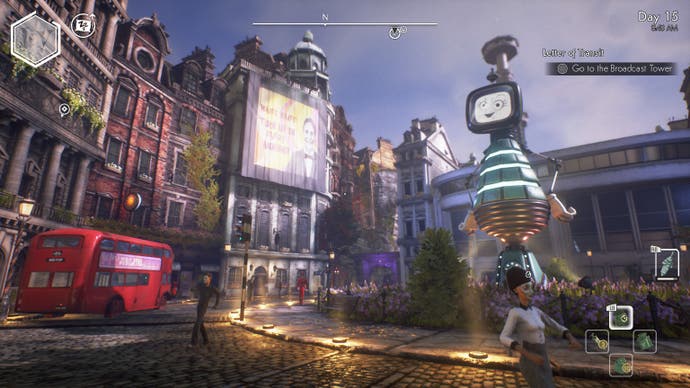
Away from the maniac bonhomie of the Parade, another variety of Britishness plays itself out in Lud's Holm, a mossy ruin where scrawny thugs police access to water and German bombs still jut from the soil. Here you'll find the Wastrels, once-upstanding folk driven from their homes after developing a chemical resistance to Joy. They wander from rubble pile to rubble pile, ravaged by past injustices they can no longer forget, Wikiquoting lines of modernist poetry. Unlike the Wellsians, the Wastrels don't harbour any murderous aversions to athleticism or looking down-at-heel, but they will turn on you if you walk amongst them in posh attire - a cruel reminder of all that they have lost.
Least friendly of all are those suffering from plague, who have undergone a kind of linguistic time-travel and only speak Middle English; they'll fight you to the death once roused, so it's best to sneak by. Caught between epochs, the plague sufferers are the deep end of a story about a society's failure to come to terms with its own, much-reburied sins (the sad irony being that Britain's real history of empire and xenophobia is infinitely worse than anything perpetrated in We Happy Few). As the loading screens sum it up, "happy is the country that has no past".
It's an apt theme for a game built around procedural generation, whose environments are at once loaded with references and history-less, their streets, landmarks and quest scenarios rearranged in every runthrough. The premise of an NPC population either high as a kite or undergoing savage withdrawal also helps justify the simulation's absent-mindedness, with hordes of outraged residents forgetting you were ever there once you break line of sight, and stepping blithely over dead bodies once the initial shock has faded. If they're in tune with the setting, however, the mechanics and scenarios by which you explore We Happy Few's satire of Britain are often its weakest element, by turns bland, rickety and a waste of some terrific ideas.
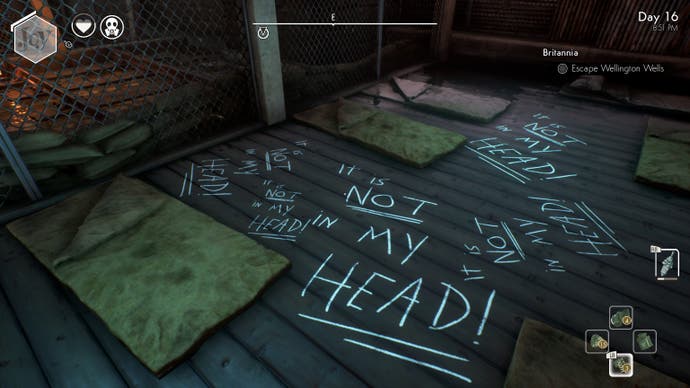
You play as three characters over three acts, each following her and his own 10-20 hour story within the same world and timeframe that overlaps with the others at critical junctures. All see you scouring town and countryside for quests, fast travel hubs and crafting resources while doing your best to either fit in or stay out of view. At the start of the game there's the choice between a pure survivalism approach where you're forced to periodically seek out food, drink and a bed, and a lighter variant where doing this boosts your stamina but isn't outright required. Either way, you can expect to pick through many a cupboard or flowerbed in hopes of the materials for some healing balm or a very British weapon like the Less Than Jolly Brolly.
While much of the game is spent roving the pristine streets and torrid wastelands, quests typically take you to a well-guarded interior where you're free to use any combination of tactics to reach a waypoint - hacking machines such as alarm systems, picking locks, crawling through vents, hiding under tables or simply beating down all resistance with a metal-plated cricket bat. Finishing these missions (rather than just slaughtering people) gives you points to spend on a few character-specific upgrades, such as a set of unique crafting recipes or the ability to choke out one of the towering Bobbies from behind. These areas are also worth visiting for the narrative artefacts that litter their crevices, from adoring fan messages to Uncle Jack through official correspondence about the mounting stresses behind Wellington Wells's postcard veneer.
It's a balance, in short, between the intensely storied, branching design of a Dishonored map and the sprawling to-do list of an Elder Scrolls. And within that marriage, We Happy Few does have plenty of intriguing ideas of its own. The best is probably its druggy take on social stealth, which sees you not only dressing to suit the area you're in but popping pills to achieve the desired demeanour. Joy - which oversaturates the visuals and causes you to fling out your wrists as you walk - is widely available, but subject to attention-grabbing withdrawal symptoms. You'll need to ingest it continually to avoid these, but take too much and you'll scramble your character's brains and undergo a temporary stat cut. A safer but less convenient strategy is to craft some Sunshine, which mimics the effects of Joy and so lets you pass by certain security systems without raising the alarm - to say nothing of the sinister Doctors, who can sniff out those not under the influence.
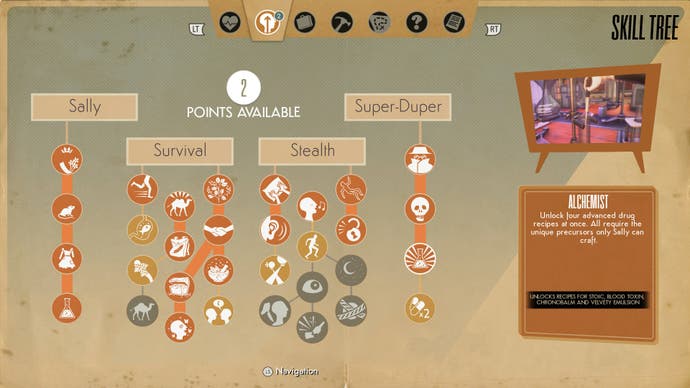
The possibilities are intoxicating, but the game never really delivers. In practice, Joy is just a visibility-lowering modifier with some caveats, and you can do without it for much of the experience, resorting to more familiar evasion tactics like running around corners or crouching in the undergrowth. And once you strip it of the question of when to trip balls, We Happy Few reveals itself to be a fairly humdrum role-playing action game, with blundering two-note combat and a roster of traps and gadgets that largely go ignored, because it's easier to smack people or leg it. Your inventory quickly fills with unused resources, forcing you to dump things or track down backpack expansions, and the ability upgrades are dominated by boring, passive buffs such as quieter lockpicking. There's a certain appeal to exposing new item recipes, some of which are mandatory to progress the story, but the excitement fades as you realise that one bludgeoning implement is much like another.
If the moment-to-moment is often a chore, We Happy Few regains some charisma care of the protagonists themselves - all sharply-written, sympathetic leads woven around a few signature skills and a core of complex ugliness. Each character offers a different lens through which to view Wellington Wells, exposing nuances which help rescue the setting from the realm of skin-deep parody. Each is also a carnival mirror for the others: you'll see their key conversations from each side as the story unfolds, and there are some provocative discrepancies between versions.
Government censor Arthur is simply trying to escape to the outside world, after chancing on a newspaper article that restores his memories of his brother Percy. With his quavering accents and thick spectacles, he's the epitome of the inoffensive middle class Brit, but flashbacks reveal that he's as much running from something as towards something else. Ollie, meanwhile, is an old Scottish soldier who is the handiest in a fight, but also the least socially acceptable. He's the character ultimately tasked with confronting the powers at be, a journey that involves comparing his memories of the War to the ignoble reality preserved at the Victory memorial camp.
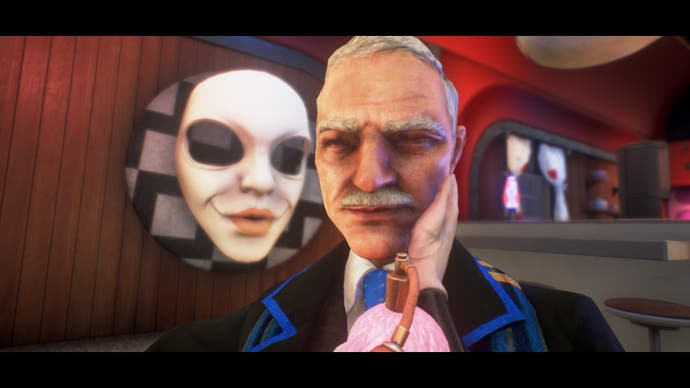
Where Arthur is a fugitive and Ollie a wild-eyed hermit, Sally begins her story somewhat at home in the game's society. She's a well-off drug dealer and fashionista, less robust in a fight but able to craft more advanced drugs and chemical weapons. She's also expert at creating chemistry with powerful men in other senses of the word. Sally's big secret and unique constraint is that she's a mother, a capital crime in a society rendered childless by Joy intake, and must head back to her flat regularly to nurse her baby. The representation of parenting is rather clunky - it's just another resource gauge with some associated debuffs - and Complusion's defining its sole female lead as a combat-averse sex icon and carer is obviously problematic. But I can only applaud the ambition to explore a role that seldom features in games: it's decisions like this that lift We Happy Few's tedium and set it apart from the genre fantasies it sometimes resembles.
After disliking We Happy Few in Early Access I was half-expecting to loathe it at launch, and there is a lot that I loathe about it: the lumpy brawling, the showers of trinkets that usually amount to nothing, the branching scenarios that only make you yearn for Dishonored's vertical mazes and chaining abilities. But for everything I dislike, there is an element of the universe and writing that grabs me by the ears. A series of damning jokes about Brutalism, that architectural aesthetic so beloved of dystopian storytellers. A bunch of quests that take the piss out of Macbeth. The use of quizshow formats and Simon Says to root out non-conformists. Uncle Jack's impersonation of Mary Queen of Scots. And above all, the way these things shift and expand as you drill into them from the perspectives of some very different people, in the course of an often deranged, but very serious and multi-faceted interrogation of history and hubris. I'm not sure the game is worth your time, but if you can find the time, you'll find much to ponder.
